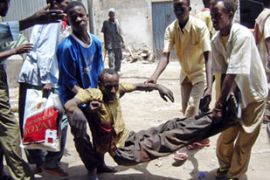Somali fighters ‘capture Kismayo’
Fighters claim third-largest city is in their hands after three days of fighting.

Ahmedou Ould-Abdallah, the UN envoy for Somalia, said in a statement on Saturday that he “deplored” the recent killings and displacement of people in Kismayo.
Kismayo earnings
He said the fighting was over the control of the port’s income.
The claims came after two foreign journalists – a Canadian woman and an Australian man – were kidnapped while travelling near Mogadishu on Saturday, two Somali civilians said.
Journalists and relief workers are frequently abducted for ransoms in Somalia, even those who travel in convoys heavily guarded by freelance armed men.
A report on the website of Canada’s National Post newspaper identified the woman as 27-year-old Amanda Lindhout.
It quoted her father, John Lindhout, as saying she had recently arrived in the country with an Australian friend who was also kidnapped.
An official at the hotel where the two were staying in Mogadishu identified the man only as Nigel, a 27-year-old from Australia.
Their Somali translator was also kidnapped, according to reports from Mogadishu.
In Kismayo, the International Committee of the Red Cross delivered by plane two tons of medical supplies to Kismayo Hospital on Saturday, said Nicole Engelbrecht, an ICRC spokeswoman.
Clan loyalties
Engelbrecht said there was also fighting in Afmadow, about 110km northwest of Kismayo, during which 135 people were wounded.
She said the agency did not have details of fatalities.
Somalia has been at war since 1991, when clan-based militias ousted Siad Barre, a socialist dictator, and then fought for power among themselves.
The conflict is complicated by clan loyalties and the involvement of archenemies Eritrea and Ethiopia, who both back opposite sides in the fighting.
The last UN peacekeeping force in Somalia included American troops who arrived in 1992 and tried to arrest warlords and create a government.
The US involvement ended in October 1993, when fighters shot down a US Army Black Hawk helicopter during a battle that killed 18 American soldiers.
Since then, Ethiopian troops have helped Somalia’s fragile transitional government push the Islamists from power in Mogadishu and much of the south, but failed to establish security or improve living standards.